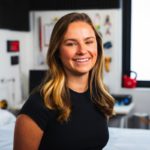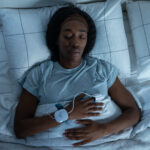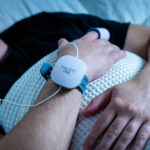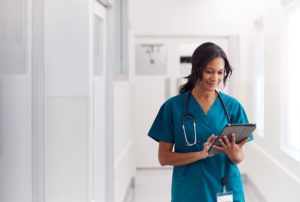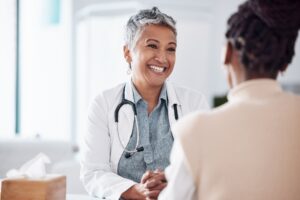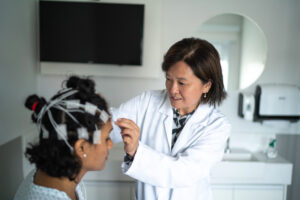When you buy through our links, we may earn a commission. Products or services may be offered by an affiliated entity. Learn more.
Sleep Clinics and Centers
Getting a restful night’s sleep can be a challenge for many. Sleep disorders are often underdiagnosed, and some people may view restless nights as normal. Although a few nights of tossing and turning may be a result of stress or a change in routine, being unable to fall or stay asleep over long periods of time may indicate the need to visit a sleep clinic.
Trouble with falling and staying asleep, snoring, or choking and gasping as you sleep can be distressing for you and your sleep partner. Understanding what a sleep clinic is and what happens there can help you talk to your doctor about next steps.
What Is the Difference Between a Sleep Center and a Sleep Clinic?
Sleep centers and sleep clinics are terms used interchangeably. Both terms refer to a medical space where sleep testing takes place. Some sleep laboratories are simply testing sites, while others offer both testing and outpatient treatment for people experiencing sleep disorders.
Skip the Clinic and Test From Your Own Bed
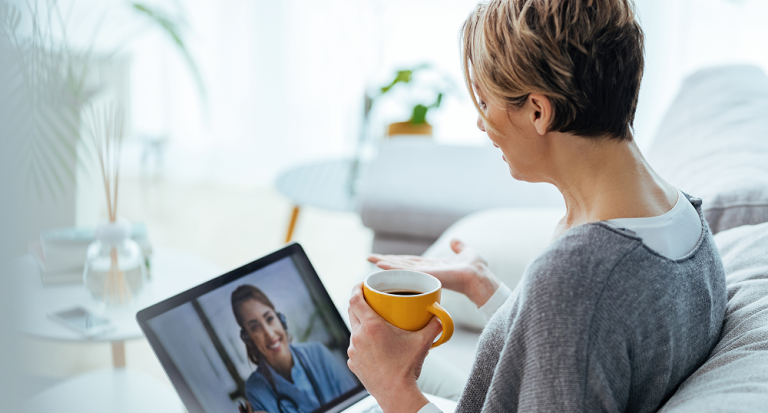
our partner at sleepdoctor.com
10% off Home Sleep Tests
Buy Now“Truly grateful for this home sleep test. Fair pricing and improved my sleep!”
Dawn G. – Verified Tester
What Happens at a Sleep Clinic?
Sleep studies, whether they’re done during the night or the daytime, are used to help your doctor diagnose common sleep and breathing issues.
Sleep clinics most often perform non-invasive testing called polysomnography to help give doctors insight into your sleep duration and patterns of brain activity during sleep. Generally, you are expected to spend the night at the clinic as they complete the testing.
When you go in for polysomnography, you’re asked to engage in your normal sleeping routine while at the clinic to the extent possible. Sensors are placed on your head and body to monitor various physiological responses. Although polysomnography is non-invasive, you might experience some discomfort when removing the sensors due to the adhesive used.
You may feel slightly uncomfortable as a sleep clinic is usually a new setting for most people. As a result, you might have trouble falling asleep. Generally, the rooms are dark and comfortable as falling asleep comfortably is key to the study. Often, you are allowed to bring personal items for comfort, such as earplugs, an eye mask, and your own pillow or bedding. Talk to the sleep specialists there if you have any concerns or are having trouble falling asleep.
Another test that may be performed at a sleep clinic is a maintenance of wakefulness test (MWT). A MWT doesn’t measure your sleeping patterns, it measures how long you’re able to stay awake during the day. A MWT is most often used when diagnosing sleep disorders such as narcolepsy or insomnia.
An MWT is performed in a dark, quiet room at a sleep center during normal waking hours. Talk to your doctor about any medications that you take that could influence the test. Some centers may ask that you don’t drink any coffee or consume caffeine as this may impact your ability to stay awake.
What Do Sleep Clinics Do?
Sleep clinics help diagnose sleeping disorders and sleeping issues. Common sleep disorders such as obstructive sleep apnea, insomnia, and narcolepsy can be diagnosed at a sleep clinic.
How Do I Know If I Need a Sleep Clinic or Sleep Center?
If you’re experiencing sleep disruptions that last longer than a few nights and do not seem to respond to changes in your bedtime routine, then you may want to consider asking your doctor about visiting a sleep clinic to test for a sleep disorder.
Sleep apnea affects approximately 2% to 4% of adults and is characterized by a repeated blocking, both partially or completely, of the upper airway. This results in symptoms such as daytime sleepiness, loud snoring with gasps, morning headaches, and trouble concentrating.
Insomnia, another common sleep disorder, is characterized by struggling to fall or stay asleep despite good conditions for sleep. Common symptoms of insomnia are troubling falling asleep most of the time, waking often during night, and not feeling refreshed in the morning.
Narcolepsy is a sleep disorder that causes disruptions to the natural sleep-wake cycle, resulting in “sleep attacks” during waking hours and an inability to sleep more than a few hours at night. Common symptoms of narcolepsy are falling asleep without warning during the day, difficulty focusing, and waking often at night, sometimes with hallucinations.
Although not everyone who experiences sleep disruptions has a sleep disorder, it is important to talk to your doctor about your symptoms, especially if they are similar to those prominent in common sleep disorders. A doctor can help you make an informed decision about whether you need to visit a sleep clinic or not.
How Do I Pick a Sleep Clinic or Sleep Center?
When choosing a sleep center, consider a few factors. First, you may want to prioritize finding a sleep center that is covered by your insurance, even partially, to help reduce your costs. Finding centers your insurance provider covers should be fairly straightforward. Most insurance companies have a search option on their website that allows you to look for clinics that are covered and in your area. Alternatively, you can call your insurance company directly for more information.
You and your doctor should discuss what type of sleep clinic would fit your needs best. Also, some sleep studies can be done from the comfort of your own home. Evidence suggests that for some disorders, these portable tests are able to monitor sleep symptoms and provide accurate diagnostics as successfully as in-person tests. Portable tests are able to offer expedited test results, as there is sometimes a wait time for a bed at sleep clinics.
You may need a referral from your doctor before you can undergo a sleep study. Your doctor may have sleep center recommendations or want to refer you to a specific clinic. You can also search for clinics in your area through a sleep clinic database or a common search engine.
Finding a Sleep Consultant
If you feel that your specific situation might not require medical attention, looking for a sleep consultant is an alternate solution. Sleep consultants are non-medical professionals who are trained to help patients identify and address a wide range of sleep health issues like insomnia, fragmented sleep and more.
When Should I Talk To My Doctor?
Sleep disruptions do not always indicate a sleep disorder. Sometimes sleep disruptions occur because of lifestyle changes, diet, weather conditions, or other factors that often only last for a brief while. However, if you’re noticing that despite maintaining good sleep hygiene and healthy habits, you still feel like you’re not getting enough sleep, it may be time to talk to your doctor.
Most notably, schedule a visit with your doctor if you’re experiencing symptoms such as:
- Snoring, often loudly, during the night
- Headaches as soon as you wake up
- Waking up during the night gasping for air
- Issues falling and staying asleep
- Extreme sleepiness or suddenly falling asleep during the day
- Inability to stay focused during the day
- Waking often during the night
These symptoms may indicate a sleep disorder is present, and your doctor will be able to help you determine your next steps.

Still have questions? Ask our community!
Join our Sleep Care Community — a trusted hub of sleep health professionals, product specialists, and people just like you. Whether you need expert sleep advice for your insomnia or you’re searching for the perfect mattress, we’ve got you covered. Get personalized guidance from the experts who know sleep best.
References
19 Sources
-
National Heart, Lung, and Blood Institute. (2022, March 24). Sleep studies., Retrieved May 21, 2021, from
https://www.nhlbi.nih.gov/health/sleep-studies -
Rundo, J. V., & Downey, R., 3rd (2019). Polysomnography. Handbook of Clinical Neurology, 160, 381–392.
https://pubmed.ncbi.nlm.nih.gov/31277862/ -
A.D.A.M. Medical Encyclopedia. (2020, January 29). Polysomnography. MedlinePlus., Retrieved May 21, 2021, from
https://medlineplus.gov/ency/article/003932.htm -
Doghramji, K., Mitler, M. M., Sangal, R. B., Shapiro, C., Taylor, S., Walsleben, J., Belisle, C., Erman, M. K., Hayduk, R., Hosn, R., O’Malley, E. B., Sangal, J. M., Schutte, S. L., & Youakim, J. M. (1997). A normative study of the maintenance of wakefulness test (MWT). Electroencephalography and Clinical Neurophysiology, 103(5), 554–562.
https://pubmed.ncbi.nlm.nih.gov/9402886/ -
Thorpy, M. J., Shapiro, C., Mayer, G., Corser, B. C., Emsellem, H., Plazzi, G., Chen, D., Carter, L. P., Wang, H., Lu, Y., Black, J., & Dauvilliers, Y. (2019). A randomized study of solriamfetol for excessive sleepiness in narcolepsy. Annals of Neurology, 85(3), 359–370.
https://pubmed.ncbi.nlm.nih.gov/30694576/ -
Schwab, R. (2020, June). Insomnia and Excessive Daytime Sleepiness (EDS). Merck Manual Consumer Version.
https://www.merckmanuals.com/home/brain,-spinal-cord,-and-nerve-disorders/sleep-disorders/insomnia-and-excessive-daytime-sleepiness-eds -
Schwab, R. J. (2020, June). Approach to the patient with a sleep or wakefulness disorder. Merck Manual Professional Version., Retrieved May 21, 2021, from
https://www.merckmanuals.com/professional/neurologic-disorders/sleep-and-wakefulness-disorders/approach-to-the-patient-with-a-sleep-or-wakefulness-disorder -
MedlinePlus: National Library of Medicine (US). (2020, January 3). Sleep disorders., Retrieved May 21, 2021, from
https://medlineplus.gov/sleepdisorders.html -
Epstein, L. J., Kristo, D., Strollo, P. J., Jr, Friedman, N., Malhotra, A., Patil, S. P., Ramar, K., Rogers, R., Schwab, R. J., Weaver, E. M., Weinstein, M. D., & Adult Obstructive Sleep Apnea Task Force of the American Academy of Sleep Medicine (2009). Clinical guideline for the evaluation, management and long-term care of obstructive sleep apnea in adults. Journal of clinical sleep medicine : JCSM : official publication of the American Academy of Sleep Medicine, 5(3), 263–276.
https://pubmed.ncbi.nlm.nih.gov/19960649/ -
National Heart, Lung, and Blood Institute. Sleep apnea – what is sleep apnea? www.nhlbi.nih.gov. Published March 24, 2022., Retrieved May 21, 2021, from
https://www.nhlbi.nih.gov/health-topics/sleep-apnea -
National Heart, Lung, an Blood Institute. (2025, January 9). What Is Sleep Apnea?, Retrieved May 21, 2021, from
https://www.nhlbi.nih.gov/health/sleep-apnea -
National Heart Lung and Blood Institute. (2020, March 2). Insomnia., Retrieved May 21, 2021, from
https://www.nhlbi.nih.gov/health-topics/insomnia -
A.D.A.M. Medical Encyclopedia. (2021, April 1). Insomnia. MedlinePlus., Retrieved May 21, 2021, from
https://medlineplus.gov/ency/article/000805.htm -
MedlinePlus, U.S. National Library of Medicine. (2020, August 18). Narcolepsy., Retrieved May 21, 2021, from
https://medlineplus.gov/genetics/condition/narcolepsy/ -
National Heart Lung and Blood Institute. (2019, February 13). Narcolepsy., Retrieved May 21, 2021, from
https://www.nhlbi.nih.gov/health-topics/narcolepsy -
Healthcare.gov. (n.d.). Getting regular medical care.
https://www.healthcare.gov/using-marketplace-coverage/getting-medical-care/ -
Shustak, S., Inzelberg, L., Steinberg, S., Rand, D., David Pur, M., Hillel, I., Katzav, S., Fahoum, F., De Vos, M., Mirelman, A., & Hanein, Y. (2019). Home monitoring of sleep with a temporary-tattoo EEG, EOG and EMG electrode array: A feasibility study. Journal of Neural Engineering, 16(2), 026024.
https://pubmed.ncbi.nlm.nih.gov/30566912/ -
El Shayeb, M., Topfer, L. A., Stafinski, T., Pawluk, L., & Menon, D. (2014). Diagnostic accuracy of level 3 portable sleep tests versus level 1 polysomnography for sleep-disordered breathing: A systematic review and meta-analysis. CMAJ: Canadian Medical Association Journal = Journal de l’Association Médicale Canadienne, 186(1), E25–E51.
https://pubmed.ncbi.nlm.nih.gov/24218531/ -
Cooksey, J. A., & Balachandran, J. S. (2016). Portable monitoring for the diagnosis of OSA. Chest, 149(4), 1074–1081.
https://pubmed.ncbi.nlm.nih.gov/26539918/
